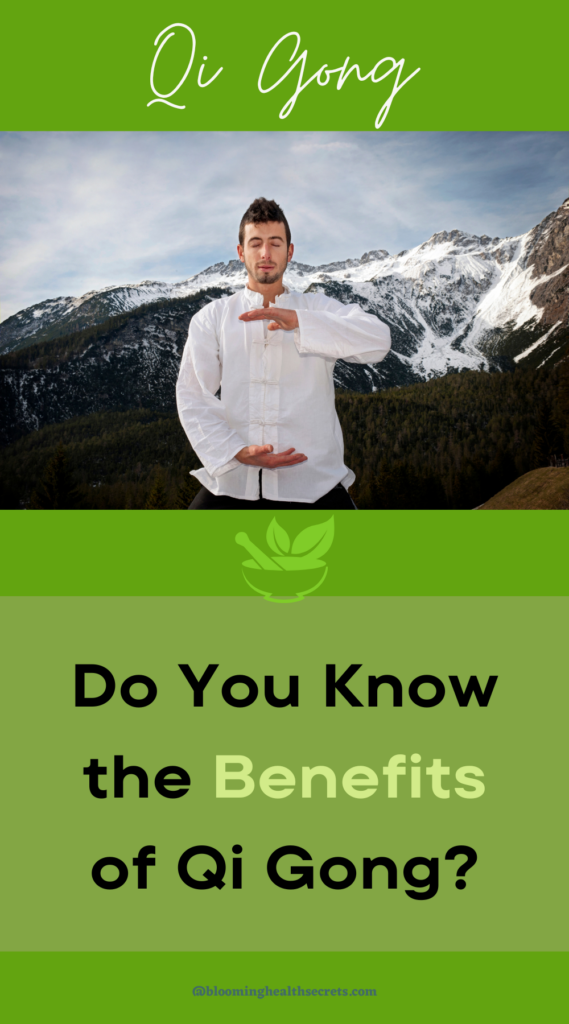Unlocking the Power of Qi Gong: A Path to Wellness
Have you ever felt a deep longing for inner peace and vitality?
In the hustle and bustle of modern life, finding harmony and balance can seem like an elusive dream.
But what if I told you that there’s a centuries-old practice that holds the key to unlocking your body’s natural healing potential?
Discover Qi Gong—a gentle yet powerful ancient Chinese art form that harmonizes the mind, body, and spirit. Join me on a journey to discover the transformative benefits of Qi Gong and how it can enrich your life.
Understanding Qi Gong: The Essence of Energy Cultivation
- What is Qi Gong?:
Qi Gong, pronounced “chee gong,” translates to “cultivation of vital energy.” It encompasses a diverse range of mind-body practices that originated in ancient China. At its core, Qi Gong involves gentle movements, breathwork, and meditation techniques designed to cultivate and balance the flow of qi (life energy) within the body. - The Philosophy of Qi:
Central to Qi Gong practice is the concept of qi, often described as the vital force or life energy that animates all living beings. In traditional Chinese medicine (TCM), qi is believed to flow through channels or meridians in the body, nourishing organs and tissues and maintaining health and vitality. - The Five Elements:
Qi Gong is deeply rooted in the principles of TCM, including the concept of the five elements—wood, fire, earth, metal, and water. Each element corresponds to specific organs, emotions, and seasons, and practicing Qi Gong can help harmonize these elements within the body, promoting overall well-being.
Benefits of Qi Gong: Nurturing Body, Mind, and Spirit
- Enhanced Physical Health:
Regular practice of Qi Gong has been shown to improve balance, flexibility, strength, and coordination. It can also help alleviate chronic pain conditions, reduce inflammation, and support cardiovascular health. - Stress Reduction and Emotional Balance:
In today’s fast-paced world, stress has become a ubiquitous companion. Qi Gong offers a sanctuary of calm amidst the chaos, helping to reduce stress levels, promote relaxation, and cultivate emotional resilience. - Improved Mental Clarity and Focus:
Through mindful movement and breathwork, Qi Gong enhances mental clarity, concentration, and cognitive function. It can help quiet the chatter of the mind, allowing for greater presence and awareness in daily life. - Energetic Rejuvenation:
Qi Gong practice facilitates the free flow of qi throughout the body, clearing energetic blockages and restoring balance. This renewed vitality can enhance overall energy levels and promote a sense of vitality and well-being.
Exploring Qi Gong Practices: A Journey of Self-Discovery
- Dynamic Qi Gong:
Dynamic Qi Gong involves fluid, flowing movements that gently stretch and strengthen the body while promoting the circulation of qi. Tai Chi, a well-known form of Qi Gong, falls under this category and is often practiced for its martial arts and health benefits. - Static Qi Gong:
Static or stationary Qi Gong involves holding specific postures or “stances” for extended periods while focusing on breath awareness and relaxation. This practice cultivates internal strength, balance, and mental stillness. - Meditative Qi Gong:
Meditative Qi Gong emphasizes inner cultivation through seated or standing meditation practices. It involves deep breathing, visualization, and mindfulness techniques to quiet the mind, cultivate inner peace, and connect with the essence of qi.
Incorporating Qi Gong Into Daily Life: Practical Tips and Guidance
- Start Slowly and Mindfully:
Begin your Qi Gong journey with patience and self-compassion. Start with simple exercises and gradually increase the duration and intensity as your practice evolves. - Practice Regularly:
Consistency is key to reaping the full benefits of Qi Gong. Aim to incorporate daily practice sessions into your routine, even if only for a few minutes each day. - Listen to Your Body:
Pay attention to how your body responds to each movement and adjust accordingly. Honor your limitations and avoid pushing yourself beyond your comfort zone. - Connect with Nature:
Practicing Qi Gong outdoors can deepen your connection with nature and enhance the flow of qi within your body. Find a serene outdoor setting and immerse yourself in the sights, sounds, and sensations of the natural world.
Frequently Asked Questions (FAQs):
- Is Qi Gong suitable for people of all ages and fitness levels?
Yes, Qi Gong can be adapted to suit individuals of all ages, fitness levels, and physical abilities. There are gentle forms of Qi Gong that are particularly well-suited for seniors or individuals with mobility limitations. - Can Qi Gong help with specific health conditions?
Qi Gong has been shown to offer therapeutic benefits for a wide range of health conditions, including chronic pain, hypertension, anxiety, depression, and insomnia. However, it’s essential to consult with a healthcare professional before using Qi Gong as a sole treatment for medical conditions. - How long does it take to experience the benefits of Qi Gong?
Some individuals may experience immediate benefits such as increased relaxation and reduced stress after just a single session of Qi Gong. However, to experience more profound and lasting benefits, consistent practice over time is recommended. - Can Qi Gong be practiced alongside other forms of exercise or meditation?
Absolutely! Qi Gong can complement other forms of exercise, such as yoga, Tai Chi, or Pilates, and enhance the benefits of meditation practices. Integrating Qi Gong into a holistic wellness routine can promote synergy and balance in body, mind, and spirit. - Are there specific resources or classes available for learning Qi Gong?
Yes, there are numerous resources available for learning Qi Gong, including books, online courses, instructional videos, and local classes or workshops. It’s essential to find a qualified instructor or resource that resonates with your needs and preferences.
Embrace the Power of Qi Gong: A Path to Wholeness and Vitality
In summary, Qi Gong offers a profound pathway to holistic well-being, inviting us to reconnect with the inherent wisdom of our bodies and the boundless energy of the universe.
Through gentle movement, mindful breathing, and inner cultivation, Qi Gong empowers us to cultivate vitality, resilience, and inner peace in our lives.
So, why wait? Take the first step on this transformative journey and discover the healing power of Qi Gong for yourself.
Further readings on Qi Gong:
- “Effect of Tai Chi and Qi Gong on Depressive Symptoms Among Community-Dwelling Older Adults:
A Systematic Review and Meta-Analysis” (2016): This meta-analysis examined the impact of Tai Chi and Qi Gong on depressive symptoms in older adults. The study found that both practices were associated with significant reductions in depressive symptoms and improved psychological well-being. - “The Effects of Tai Chi and Qigong on Immune Responses: A Systematic Review and Meta-Analysis” (2017):
This systematic review investigated the effects of Tai Chi and Qi Gong on immune function. The findings suggested that these mind-body practices may enhance immune responses, including increasing levels of certain immune cells and reducing inflammation. - “Effects of Qigong Exercise on Biomarkers and Mental and Physical Health in Adults With at Least One Risk Factor for Cardiovascular Disease: A Meta-Analysis of Randomized Controlled Trials” (2018):
This meta-analysis explored the effects of Qigong exercise on biomarkers and health outcomes in adults with cardiovascular risk factors. The results indicated that Qigong exercise was associated with improvements in blood pressure, cholesterol levels, and mental health parameters. - “The Effects of Tai Chi and Qigong on Health-Related Quality of Life in Cancer Survivors: A Systematic Review and Meta-Analysis” (2018):
This systematic review and meta-analysis examined the impact of Tai Chi and Qigong on health-related quality of life in cancer survivors. The study found that both practices were associated with improvements in physical functioning, fatigue, and overall quality of life. - “Effect of Qigong on Self-Rating Anxiety Scale in Patients with Generalized Anxiety Disorder: A Meta-Analysis of Randomized Controlled Trials” (2019):
This meta-analysis investigated the efficacy of Qigong in reducing anxiety symptoms in patients with generalized anxiety disorder. The findings suggested that Qigong practice was effective in alleviating anxiety symptoms and improving overall well-being. - “The Effects of Tai Chi and Qigong on Balance and Falls: A Systematic Review and Meta-Analysis” (2020):
This systematic review and meta-analysis evaluated the effects of Tai Chi and Qigong on balance and fall risk in older adults. The results indicated that both practices were effective in improving balance and reducing the risk of falls. - “Effects of Qigong on Quality of Life, Vitality, and Fatigue Among Patients With Cancer: A Meta-Analysis” (2020):
This meta-analysis examined the effects of Qigong on quality of life, vitality, and fatigue in cancer patients. The study found that Qigong practice was associated with significant improvements in these outcomes, highlighting its potential as a supportive therapy for cancer patients. - “Tai Chi and Qigong for the Treatment and Prevention of Mental Disorders: A Systematic Review and Meta-Analysis” (2021):
This systematic review and meta-analysis investigated the efficacy of Tai Chi and Qigong for the treatment and prevention of mental disorders. The findings suggested that these mind-body practices may have beneficial effects on various mental health outcomes, including depression, anxiety, and stress. - “Effectiveness of Qigong Exercise in Relieving Symptoms of Individuals With Parkinson’s Disease: A Systematic Review and Meta-Analysis” (2021):
This meta-analysis examined the effectiveness of Qigong exercise in relieving symptoms of Parkinson’s disease. The study found that Qigong practice was associated with improvements in motor symptoms, balance, and quality of life in individuals with Parkinson’s disease. - “The Effects of Qigong on Sleep Quality: A Systematic Review and Meta-Analysis of Randomized Controlled Trials” (2021):
This systematic review and meta-analysis investigated the effects of Qigong on sleep quality. The findings suggested that Qigong practice was associated with improvements in various aspects of sleep, including sleep duration, efficiency, and subjective sleep quality.
These studies provide valuable insights into the potential benefits of Qi Gong across different health conditions and populations, supporting its use as a complementary therapy for promoting physical, mental, and emotional well-being.



